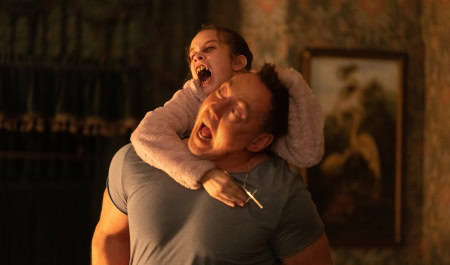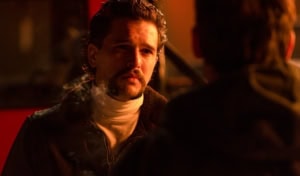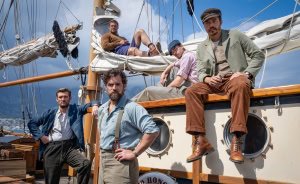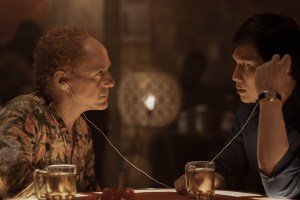Narcos: Mexico Season 2 had a lot going on. It picks off where season one left off. We see Operation Leyenda in full force. Michael Pena’s character Kiki Camarena was killed in season one. As a result, season two focused on the mission of revenge. Previous seasons of Narcos have been centered around real-life characters and have been narrated by those playing said real-life characters. Season two of Mexico was different. Season one was not narrated by Pena, rather a mystery character. It was revealed that this was Scoot McNairy, playing DEA Agent Walt Breslin. As opposed to Steve Murphy, Javier Pena, and Kiki, Breslin was not a real-life character.
Spoilers
In an interview with The Hollywood Reporter, Executive Producer Eric Newman spoke about the creation of this composite character:
Each season of Narcos has had a DEA consultant. This season’s starring DEA character, Walt Breslin (played by Scoot McNairy), is an amalgamation of several real-life agents. How did you create the character of Walt?
When we started interviewing people who had participated in Operation Leyenda, which was the justice/revenge mission for the murder of Kiki Camarena, it was a study in contradictions. A lot of people claimed they were running it, the efforts differed in terms of what the mission mandate was, and we also found that the outcome was murky at best and, in many cases, just outright disappointing. And so as we had approached it — because we didn’t know much about it — we were hoping, hopefully as the audience was hoping, that there was some justice here. And we were frustrated to learn there was never any real justice. Very few of the actual guilty parties were punished [Gallardo is currently serving a 37-year prison sentence for the death of Camarena] and those that were were part of a political barter, rather than actual justice. So we came up with the idea of basically taking a character who was a composite of all those characters, but who approached it with some hope that we could get to the bottom of it if we took our gloves off and fought as dirty as they seemed to be fighting. And then to see that character be disappointed seemed like a pretty powerful way to tell the story.
Why did you decide to keep the narrator character of Walt and McNairy’s casting a secret during season one? Did you always have that plan in mind for him to star in season two?
Yes. We always planned on having someone — an idealist, a naïve but tough cop — who is going to come in and run this operation. Someone who, I think like a lot of DEA guys, didn’t even know Kiki Camarena, but who brought with them this need for justice. The need to remind people that you can’t kill an American federal agent and get away with it. The fact that it was Scoot McNairy, I mean, what an unbelievable blessing that he took this ride with us. And I love working with him. What we’ve done in the past is that we’ve passed the baton with the traffickers: Pablo Escobar died and Cali took over; then when we began season four, Mexico season one, we introduced a new cartel. It seemed like it was time to introduce a new lawman, someone with attitude. And one where people, after being frustrated by our inability to prevail, could be given a more hawkish approach to law enforcement. Someone who is a little more bare-knuckle and more hardass. And, of course, that’s still not going to work, either.
Newman also spoke about Operation Leyenda. If you recall, in Narcos season one, Pena explains that Operation Leyenda is the reason why DEA Agents wouldn’t be touched during Murphy’s time in Colombia. But, what about the real Operation Leyenda? Did it actually succeed in doing anything?
Given how much Operation Leyenda ultimately failed in seeking justice for the murder of Kiki Camarena, and failed the DEA agents who were involved, do you think America has learned or corrected things since?
No. No. I need to think that people who were actually in it, who were in the field, have probably learned a lot about how to conduct this kind of stuff. But you realize that you are subject to the agendas of greater beings — the U.S. state department and free trade affecting the economies of nations. It’s a painful civics lesson for someone who wants justice for all the right reasons. So, I think that what we failed to do and failed to see is that the only way that people have a shot to try to diminish the demand for drugs is not as sexy as going down and getting photographed in front of a field of coca leaves or marijuana getting burned. There’s a sensational aspect to seeing tables full of cocaine and proof that we’re winning the war on drugs. So if we learn anything in Narcos, it’s that we learn nothing.
Another part of this season that I loved was the relationship between druglord Pablo Acosta and Mimi Webb Miller. Sosie Bacon played Mimi. Newman offers insight as to why he decided it was important to tell this unique love story.
The real Mimi Webb Miller (the love interest to drug lord Pablo Acosta who is played by Sosie Bacon) was a consultant this season, and offered a female perspective for the first time. What attracted you to telling her story and showing her relationship with Pablo?
Her story is amazing and we’re really grateful that she trusted us. She lined up with something I’ve always felt and believed, which is: these guys are human beings. Mimi Webb Miller loved this guy that happened to be in [the drug war]. She served as a truthful lens through which you see someone who, yeah, he was a drug dealer but she loved him, and he was deserving of that love. He wasn’t a monster. None of these guys are monsters. They do monstrous things, but there’s always a human being in there somewhere. We read the book Drug Lord by Terrence E. Poppa, which is about Pablo Acosta and one in which Mimi is featured, and it’s one of my favorite books about the drug war. I highly recommend it.
Who else did you consult with for this season?
We talked to Terrence Poppa and we very much had the Pablo Acosta story down. We continued to rely on [former DEA agent] James Kuykendall, who of course had a real interest in seeing Leyenda come to an end [and who was portrayed in Narcos: Mexico season one]. And then we spoke to a variety of DEA guys who were part of Leyenda, but none of whom I would want to name.
Unlike the end of Narcos season two, where Pablo Escobar was killed, Felix Gallardo was left alive. Imprisoned. But, alive. Does this mean we can see more of him?
The season wraps Felix Gallardo’s story with him ending up in prison. In reality, Gallardo continued trafficking from behind bars for some time. Is this the end for that character and for Diego Luna?
Old habits die hard — they all sort of keep hold of it as long as they can. And a lot of people might want them dead, so they continue to finance their own security and justify their worth. He did for a while [continue], as did Rafa Quintero [played by Tenoch Huerta, who made a cameo in season two], who [in reality] got out of jail and went back into the business. That’s how you earn a living in these endeavors — you do it as long as you can. But I do think [this is our goodbye to that character]. Diego is going off to a galaxy far, far away! He’ll always be with us in spirit and, honestly, what an incredible privilege to work with him the last two years. I love him.
How do you define Gallardo’s stamp on the Mexican drug war, given what happens next? In the final scene, he explains to Walt that the plazas splitting off will work only in the short-term. How does his exit represent a passing of the torch from the old to the new cartels?
Felix was the beginning of it. Where we’ve gone is with several new, younger, more violent cartels that have no regard for human life and who don’t recognize what the old guard did, which is that bodies hanging from telephone poles is not good for business. What’s happening in Mexico now is very much this power struggle between the old guard and the new guard, and I think it’s in everyone’s best interest that the old guard wins.
In the Narcos saga, you’ve spoken about the evolution of how Escobar took on the government, the Cali bosses tried to buy the government and the Guadalajara cartel partnered with the government. If that is the history, how do the next Mexican cartels in charge — Tijuana, Sinaloa and Juarez — handle the government?
For as long as they can, they enjoy the partnership and protection of the government. Something that happens in Mexico right around this time, post-1988, is the privatization of a lot of Mexican state businesses and the creation of a class of super-wealthy people. Prior to the late ‘80s, early ‘90s, I think there was one billionaire in Mexico. And post-1993 there were 20. It was the creation of a new economy. And, at some point, those guys played in here as well. And then for the government, in those economic interests where drug money was no longer the biggest source of revenue, there was industrial wealth born of NAFTA that was generated and these drug dealers became more disposable. The government could [use them up] every once in a while, like they did Felix Gallardo and like they did Chapo Guzman more recently, where they could say [to the U.S.], “Hey, we’re your partners in the war on drugs here.” And of course it didn’t really affect the flow of drugs, but it served to make nice politically and allow us to maintain this sort of healthy business relationship that seems to drive everything these days in globalization. Money is everything.
The ends sets up El Chapo of Sinaloa (Alejandro Edda), Amado Carrillo Fuentes of Juarez (José María Yazpik) and the Benjamín Felix of Tiujana (Alfonso Dosal) to be the next bosses for a hypothetical third season. Did you end with a season three in mind and what is the status of those talks?
As I always say, we’ll go on as long as they let us and as long as the drug war rages — which, as you know, there is no end in sight. But I would be lying if I said I hadn’t put quite a bit of thought into where we would go. I’ve always had a pretty fair idea at where we end up. That’s about all I can say about season three. But it’s definitely something that we’re actively discussing internally.
Newman was then asked about McNairy’s character. With Felix locked up, where does this leave Walt Breslin?
Is there a place for Walt Breslin in season three, or would you bring in the next DEA agent in charge?
There might be. I think we would only be so lucky as to continue to work with Scoot McNairy.
The final scene that sets up the future of Narcos is the prison conversation and first confrontation all season between Walt and Felix (and, by extension, McNairy and Luna). Was that totally imagined?
Yes. That was entirely manufactured. We felt like we needed to see two guys who lost, who both failed in their efforts, having a bit of a commiseration and a warning of things to come.
What did you think of Narcos: Mexico Season 2?







